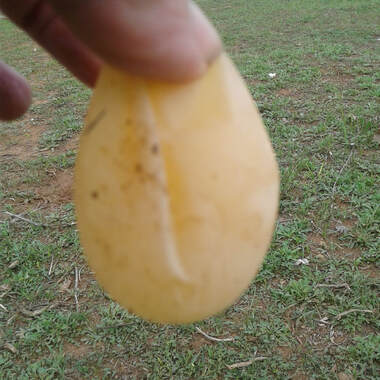If your hen is laying soft shelled eggs it usually indicates that there is a vitamin deficiency or illness of some type. Usually this is caused from a calcium deficiency, a vitamin D deficiency or a phosphorus deficiency. Phosphorus is vital to develop hard shells. Egg shells have tiny pores which let moisture and carbon dioxide out while allowing air to seep inside the egg. Soft shelled eggs can also indicate that your hen may be sick.
 What to do if your hen is laying soft shelled eggs. Photo courtesy of Chicken Heaven On Earth
What to do if your hen is laying soft shelled eggs. Photo courtesy of Chicken Heaven On Earth
Egg shells are made from calcium carbonate inside the chickens body. The yolk is about 34% of the weight of an egg. The yellow orange color of the egg yolk is determined by what the hen eats. A hen that free ranges and has access to plenty of insects and fresh greens will have a darker yolk than one who is caged. The temperature of an egg when hatched is approx. 105 degrees. (Eggs 101). What you feed your chicken is vitally important to their growth, development, health, and egg production. You should supply a feed that provides calcium, vitamin D, phosphorus and high in protein for egg laying hens. If you suspect your hens are not getting the vitamins, minerals, and proteins they need you should add a calcium supplement, such as grit made from oyster shell and give them supplements that provide vitamins, minerals, and electrolytes. You can also give them high protein treats like mealy worms occasionally. (Do not feed them earth worms). Soft shelled eggs can also indicate that your chicken may need to be treated for worms.
Egg Drop Syndrome 76 a slow moving virus can also be a cause of soft shelled eggs in un-vaccinated flocks which can result in severe loss of egg production.
What to do if your hen is laying soft shelled eggs:
Hens who lay soft shelled eggs should be quarantined away from the flock.
Provide vitamin and electrolyte supplement.
Treat birds for parasites and worms.
Everything your birds come in contact with should be washed and disinfected.
Feed should be checked for signs of mildew, dampness, or rodent infestations.
Water sources should be chlorinated and checked for contamination such as green fungus or slime.
Move your coop if possible.
Egg Drop Syndrome 76 a slow moving virus can also be a cause of soft shelled eggs in un-vaccinated flocks which can result in severe loss of egg production.
What to do if your hen is laying soft shelled eggs:
Hens who lay soft shelled eggs should be quarantined away from the flock.
Provide vitamin and electrolyte supplement.
Treat birds for parasites and worms.
Everything your birds come in contact with should be washed and disinfected.
Feed should be checked for signs of mildew, dampness, or rodent infestations.
Water sources should be chlorinated and checked for contamination such as green fungus or slime.
Move your coop if possible.
Informative Teacher's Guide Eggs 101 pdf. http://www.aeb.org/images/PDFs/Educators/Eggs101TeachersGuide.pdf

